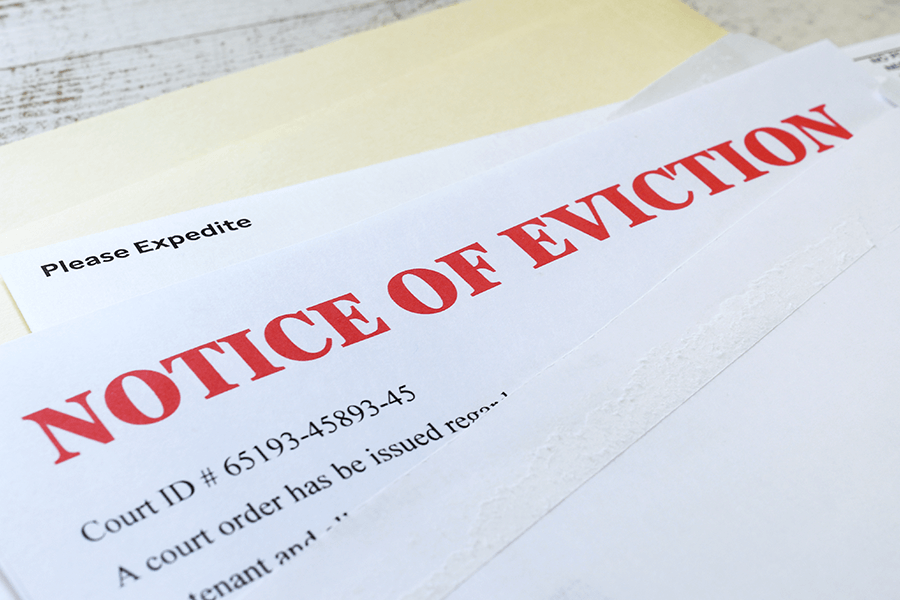
REAL PROPERTY
Whether you are a landlord seeking to reclaim your property from the tenant from hell or a tenant defending himself against the intrusive unstable landlord, it is important that you understand the eviction or termination of lease process as outlined in the Florida Statutes. Anything other than strict compliance with the process will see you on the losing side of a battle that is becoming more and more common in South Florida thanks to the unprecedented growth in property value and rents over the last few years; a growth not matched by wages.
Before diving into the process, let’s review the legal concept that gives the tenant the right to occupy the property in the first place and why a landlord can’t just throw that tenant out whenever he wants; the lease.


A lease is “a contract in writing, under seal, whereby a person having a legal estate in hereditaments, corporeal or incorporeal, conveys a portion of his interest to another, in consideration of a certain annual rent or render, or other recompense.” Black’s Law. As long as the lease is in effect, the tenant cannot be removed from the property. Put another way, before a tenant can be evicted, the lease must be terminated.
How is a lease terminated? The most obvious way of course is by natural expiration in accordance with its terms. If a lease is for the term of one year, then the lease terminates one year from the day it began. If a lease is quarterly, then the lease expires at the end of the quarter. Simple right? There is one catch that both landlords and tenants need to be aware of. Florida Statutes 83.57 and 83.575 deal with the termination of tenancies without and with a specific term or duration respectively. While this is an oversimplification and there are numerous caveats, as a general proposition both statutes provide for the termination of a lease at the end of its term so long as notice of termination or non-renewal is provided. How much notice is required? That depends on the terms of the lease, which control the notice requirements (so long as they fall within certain parameters). If the lease is silent, an annual tenancy requires sixty (60) days’ notice, a quarterly tenancy requires thirty (30) days’ notice, a monthly tenancy requires fifteen (15) days’ notice, and finally a week-to-week tenancy requires seven (7) days’ notice. So long as the landlord provides sufficient notice, the lease ends at the expiration of its term, and if the tenant remains on the property, they become a holdover tenant and are subject to removal.
In addition to terminating naturally, tenancies can also be terminated by mutual agreement of the parties, or, on the initiative of only one party, the latter being what is commonly called an eviction action. While the term “eviction” is often used to describe the entire process of removing a tenant, it actually only refers to the part of the process that begins with the filing of a complaint for eviction with the court. Before that can be done, the landlord must terminate the lease. To do that, the landlord must strictly adhere to Florida Statute 83.56.

Florida Statute 83.56(2) allows for a landlord to terminate a lease if the tenant is in violation of the provisions of Florida Statutes 83.52 or a material provision of the lease agreement and divides those violations into two categories; violations for which the tenant should be given an opportunity to cure and those which allow for immediate termination of the lease. Repetitive violations for the same conduct also allow for immediate termination.
While no exhaustive list is provided, the Florida Statutes provide a list of examples of conduct for which a tenant should not be given an opportunity to cure such as destruction, damage, or misuse of the landlord’s or other tenants’ property by intentional act or a subsequent or continued unreasonable disturbance and violations for which a tenant should be given an opportunity to cure such as activities in contravention of the lease or this part such as having or permitting unauthorized pets, guests, or vehicles; parking in an unauthorized manner or permitting such parking; or failing to keep the premises clean and sanitary.
In the case of violations for which the tenant should not be given an opportunity to cure, the landlord must provide the tenants with a written notice specifying the noncompliance and the landlord’s intent to terminate the rental agreement by reason thereof. The statutes proscribe the form of the notice and the method of delivery (hand delivered or left at the property if tenants are not in occupancy). After the expiration of seven days from then date of service of the notice, assuming the notice adheres to the requirements of the statute and is properly served, the landlord may terminate the lease.
In the case of violations for which the tenant should not be given an opportunity to cure, the same procedure applies except the form of the notice is different and if the tenant does in fact cure the violation before the expiration of seven days, the lease is not terminated, and the process stops. If the tenant does not cure the violation, just as above, the landlord may terminate the lease at the expiration of seven days.
Florida Statute 83.56(3) outlines the procedure for terminating a tenancy for the nonpayment of rent. When a tenant is three days late with rent (excluding Saturday, Sunday, and legal holidays), the landlord can give the tenant a three-day notice to pay rent or move out of the rental (“quit”). The notice must state that the tenant has three days (excluding Saturday, Sunday, and legal holidays) to either pay rent or move out of the rental unit. The notice must be similar to the following:
You are hereby notified that you are indebted to me in the sum of _____ dollars for the rent and use of the premises [insert address of leased premises, including county], Florida, now occupied by you and that I demand payment of the rent or possession of the premises within 3 days (excluding Saturday, Sunday, and legal holidays) from the date of delivery of this notice, to wit: on or before the [date] day of [month], [year]. [Insert landlord’s name, address, and phone number.]
If the tenant doesn’t pay rent or move by the deadline, the landlord can file an eviction lawsuit. (Fla. Stat. § 83.56(3) (2024).)
A landlord doesn’t have a reason to end the tenancy early when a tenant is current with rent and hasn’t materially violated the terms of the tenancy. In this situation, the landlord’s method of ending the tenancy depends on whether the tenancy is month-to-month or for a fixed term (such as a year).
A Florida landlord can terminate without cause a month-to-month tenancy by giving the tenant a written notice at least 30 days before the end of the monthly period. The notice must inform the tenant that the tenancy will end in 30 days and that the tenant must move out of the rental unit by that time. (Fla. Stat. § 83.57 (2024).)

Landlords can’t terminate fixed-term tenancies without cause—they must wait until the term of the tenancy ends. Then, it’s simply a matter of not renewing the tenant’s lease. And, unless the lease states otherwise, Florida landlords don’t have to give tenants notice that the lease isn’t being renewed. For example, if the tenant has a lease for one year that expires in December and the tenant hasn’t requested a lease renewal, the landlord won’t need to give the tenant notice to move by the end of December unless the lease specifically requires it.
Whether the lease terminates naturally by its terms, by the landlord for cause by either violation of the terms or nonpayment of rent, or by the landlord without cause, so long as proper procedure is followed If the tenant does not move out, the tenant becomes a “holdover tenant” per Florida Statute 83.58 and subject to removal per Florida Statute 83.59. The action contemplated by Florida Statute 83.59 is the actual eviction proceeding.

Chairman, CEO, & Managing Director of Legal Services
The Law Offices of Joshua M. Stahley, P.A
We are a boutique law firm combining the breadth of practice and knowledge one would expect from a large global law firm with the personal, white glove, touch our clients love and that we proudly own as our hallmark. Our team stands ready to advise and provide counsel on matters ranging from car accidents to international tax controversies, divorce to estate planning, and everything in between.


